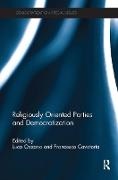Ulteriori informazioni
The book provides an original typology of religiously oriented parties that is a useful guide to understand their nature, their organisational models and, crucially, how they might impact on democracy and democratization in a number of different contexts across the world.
It was published as a special issue of
Democratization.
Sommario
1. Introduction: religiously oriented parties and democratization 2. The many faces of the political god: a typology of religiously oriented parties 3. The perils of polarization and religious parties: the democratic challenges of political fragmentation in Israel and Turkey 4. Moderation through exclusion? The journey of the Tunisian Ennahda from fundamentalist to conservative party 5. Refining the moderation thesis. Two religious parties and Indian democracy: the Jana Sangh and the BJP between Hindutva radicalism and coalition politics 6. Ahab and the white whale: the contemporary debate around the forms of Catholic political commitment in Italy 7. Religious parties in Chile: the Christian Democratic Party and the Independent Democratic Union 8. Religion and democratization in Northern Ireland: is religion actually ethnicity in disguise? 9. Conclusion: reassessing the relation between religion, political actors, and democratization
Info autore
Luca Ozzano is Assistant Professor of Political Science at the University of Turin, in Italy. His research focuses on the relation between religion and democracy, both in theoretical terms, and in relation to case studies such as Italy and Turkey.
Francesco Cavatorta is Associate Professor of Political Science at Université Laval in Québec, Canada. His research broadly focuses on the politics of the Arab world and specifically on Islamist movements, Islamist parties and democratization.
Riassunto
The book provides an original typology of religiously oriented parties that is a useful guide to understand their nature, their organisational models and, crucially, how they might impact on democracy and democratization in a number of different contexts across the world. It was published as a special issue of Democratization.

